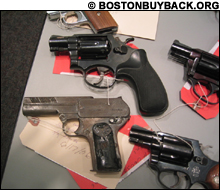
$200 TOWARD YOUR NEXT GUN?: A sample of the guns turned in during Mayor Menino’s recent gun buy-back program (ironically, each gun was worth a $200 gift card from Target, a store with a bulls-eye for a logo). |
Three months ago, Boston was averaging a shooting a day. It is an even deadlier place to live this summer. Since the start of May there have been, on average, three victims of gunfire — fatal and non-fatal — every two days. Since June 7, that figure has inched upward to almost two a day.More people were murdered in Boston over the past two months than in any May-to-June stretch since 1990, a year that saw the highest number of homicides in the city’s history. All told, more than 200 people have been shot in Boston this year — almost 20 percent more than in all of 2003 (the last year of quiet before the current upsurge began).
And summer is just beginning; the rain is finally clearing and school has just let out. It’s no wonder, then, that residents are sending their kids to live with relatives for the warm season. Summer 2006 looks to be bloody.
A Phoenix examination of the 150-plus shootings and stabbings since May 1 shows just how widespread and fluid the violence has become within affected communities. The Codman Square area, which was quiet over the winter, has recently exploded with gunfire, as have other hot spots, including Fayston Street, in Roxbury; the intersection of Bowdoin Street and Geneva Avenue, in Dorchester, and Blue Hill Avenue between Morton and Walk Hill Streets, in Mattapan.
But here’s the rub: overall violence and crime are not on the rise. The number of shooting victims during the past 10 weeks is twice as high as it was during the same period last year, yet the total number of aggravated assaults is actually lower, as are the number of rapes, robberies, burglaries, larcenies, and vehicle thefts. In fact, other than a relatively small increase in aggravated assaults over the past three years, all major crime categories have either remained stable or declined, while the number of gunfire victims has tripled.
This fact — that crime and violence are not rising, but shootings are — deserves much more recognition than it has received. It tells us that the dramatic change in the past three years is not that more young men are turning to violence and crime. It is that they are more often armed and ready to fire.
The problem here is guns.
A new study from the Terry Sanford Institute of Public Policy at Duke University, published in the summer issue of the Journal of Policy Analysis and Management, finds a national truism indicative of Boston’s current situation. “Gun prevalence has a more-or-less neutral effect on other crimes, including assault and robbery,” the authors write in the paper, “Aiming for Evidence-Based Gun Policy.” “Guns do not affect the overall volume of violence, but do affect its intensity.”